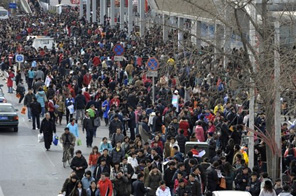China continues to reel under job crisis
BEIJING: China's jobless situation is "very grave," with millions out of work due to the global crisis and the threat that unemployment might rise despite recent improvements in the economy, the government said Tuesday.
Beijing is trying to create jobs for laid-off workers, new college graduates, migrants and others, said Wang Yadong, deputy director of job promotion at the Ministry of Human Resources and Social Security.
"The employment situation in China is still very grave. We are still under enormous pressure to provide employment services," Wang said at a news conference.
Officials have warned that China's recovery is not firmly established despite an acceleration in economic growth last quarter to 7.9 percent over a year earlier, up from 6.1 percent the previous quarter. That was boosted by Beijing's 4 trillion yuan ($586 billion) stimulus, which is pumping money into the economy through building highways and other public works that have created construction jobs.
"To make things worse, the financial crisis has still not bottomed out," Wang said. "There is still a great potential risk of unemployment." Employment is especially sensitive for the communist government, which bases its claim to rule on delivering economic gains and worries about unrest among jobless workers.
As many as 30 million migrants lost jobs when factories closed as global demand for exports collapsed last year, according to the government. It has given no details of overall unemployment and how many new jobs have been created.
Wang said Beijing is confident it can keep official urban unemployment below 4.5 percent this year after it hit 4.3 percent in the first two quarters. That rate measures only a narrow segment of the economy, focusing largely on big and state-owned companies, and it is unclear whether it shows anything about overall employment.
Wang said the government would continue trying to boost domestic demand to spur job growth.
About 3 million recent university graduates, or one-third of the total, are unemployed, Wang said. Many come from the urban elite of businesspeople and professionals who benefited most from China's economic reforms, and Beijing is trying to retain the support of their families by promising to make finding jobs for them a priority.
Some 3 percent of the 67 million rural migrants who returned to cities following the Spring Festival holiday in February are still looking for jobs, according to Wang.






